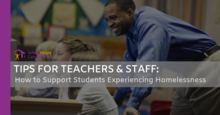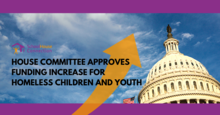Found 147 resources.
0
0
0

For many students experiencing homelessness, school is the only place of stability in their lives. Teachers play a crucial role in creating a classroom environment that is safe and supportive for all students, especially those who are highly mobile and have experienced the trauma that often accompanies homelessness. Here, we provide information and strategies that teachers and support staff can use to support the educational success of students experiencing homelessness.
Topics: Child welfare, Education, Homelessness, Housing
 Shared by Housing Is
on May 15, 2019
Shared by Housing Is
on May 15, 2019 0
0
0

On May 9, the House Appropriations Committee passed its FY2020 appropriations bill for Labor, Health and Human Services, and Education. The House bill includes $100 million in FY2020 funding for the McKinney-Vento Act’s Education for Homeless Children and Youth (EHCY) program. This represents a 7% increase over the FY2019 level; if enacted, it would represent a 30% increase in EHCY funding since FY2017.
Topics: Child welfare, Funding, Homelessness, Housing, Legislation & Policy
 Shared by Housing Is
on May 15, 2019
Shared by Housing Is
on May 15, 2019 0
0
0
Low- and moderate-income families in Puerto Rico would get a significant income boost from the Working Families Tax Relief Act, which would substantially expand the Child Tax Credit (CTC) in Puerto Rico as well as nationally and also help the Commonwealth expand its own, recently implemented Earned Income Tax Credit (EITC). The bill, which Senators Sherrod Brown, Michael Bennet, Richard Durbin, and Ron Wyden introduced recently, would reduce poverty and increase economic security for millions of working families in the United States, including Puerto Rico.
Topics: Child welfare, Legislation & Policy, Low-income, U.S. Territories
 Shared by Housing Is
on May 15, 2019
Shared by Housing Is
on May 15, 2019 0
0
0
Recent research has begun to focus on the impact of housing instability, in its many forms, on child health and development. It is hypothesized that young children are at greater risk of adverse effects of living environments, as this time period serves as a critical window for establishing socialization and learning habits. Additionally, the effects of housing instability may be compounded when combined with other challenges faced by low-income families, such as lack of resources. Previous studies have found that housing instability is associated with deficits in overall academic achievement...
Topics: Child welfare, Education, Health, Homelessness, Housing, Research
 Shared by Housing Is
on May 9, 2019
Shared by Housing Is
on May 9, 2019 0
0
0

Research shows that clinical care is only one factor that impacts population health and that a collection of other factors – including the natural and built environment where people live, education economic stability, food, and community and social context – grouped under the term social determinants of health (SDOH), have significantly more influence on care utilization, outcomes, and population health. Together, these factors account for 60% of preventable mortality.
Topics: Child welfare, Early childhood, Health, Low-income, Medicaid / Medicare
 Shared by Housing Is
on May 2, 2019
Shared by Housing Is
on May 2, 2019 0
0
0
Moving Health Care Upstream (MHCU) is based on the belief that health systems can address persistent and costly health inequities by moving “upstream”—beyond the walls of hospitals and clinics and into the communities, collaborating with community-based organizations to address the root causes of disease. The various areas of work within MHCU share a common focus-supporting hospitals and community stakeholders in testing and spreading strategies to move upstream, and sharing “what works” to inform the field and accelerate the upstream movement in the field as a whole. Policy Learning Labs are...
Topics: Child welfare, Early childhood, Food insecurity, Green, Health, Housing, Legislation & Policy, Nutrition, Partnerships, Youth
 Shared by Housing Is
on May 1, 2019
Shared by Housing Is
on May 1, 2019 0
0
0
Congress has an important opportunity in 2019 to improve the health of millions of our nation’s children by passing a strong reauthorization that protects and strengthens the child nutrition programs. These successful, cost-effective federal nutrition programs play a critical role in helping children in low-income families achieve access to child care, educational, and enrichment activities while improving overall nutrition, health, development, and academic achievement.
Topics: Child welfare, Early childhood, Food insecurity, Funding, Legislation & Policy, Low-income, Nutrition
 Shared by Housing Is
on May 1, 2019
Shared by Housing Is
on May 1, 2019 0
0
0
Self-paced courses for home visitors and supervisors and webinars that cover: the basics of home visiting, foundations of infant mental health in home visiting, domestic violence in home visiting, substance abuse in home visiting, the impact of trauma on home visiting, building engaging and collaborative relationships with families, and home visiting with families during pregnancy.
Topics: Child welfare, Early childhood, Health, Home visiting
 Shared by Housing Is
on Apr 29, 2019
Shared by Housing Is
on Apr 29, 2019 0
0
0
Housing and land use policies have a significant effect on schools, and since these policies are usually decided at the state and local level, educators and education advocates have the opportunity to play a significant role. Housing and land use policies can affect enrollment trends, concentrations of poverty and school diversity, school funding, stability of enrollment vs. “churning” of students, and ability of students to complete their homework and focus during the school day.
Topics: Child welfare, Education, Housing, Legislation & Policy
0
0
0

April is National Child Abuse Prevention Month, an opportunity to recognize the importance and raise awareness of our roles —families, communities, service providers, researchers, policy makers and others— in working together to prevent child abuse and neglect and to promote the overall social, physical, and emotional well-being of children and their families.
Topics: Child welfare, Family engagement, Health, Homelessness, Housing, Safety
 Shared by Housing Is
on Apr 17, 2019
Shared by Housing Is
on Apr 17, 2019 0
0
0
To better align families’ child welfare and supportive housing needs, child welfare leaders must clearly present their vision for the role of supportive housing as a part of positive child welfare outcomes. State administrators and leaders must consider critical aspects of housing within the Family First IV-E Prevention Program Five-Year State Plan (State Plan) and introduce necessary state policy, legislative, and budgetary changes to ensure that stable, supportive housing is central to long-term family stability and well-being
Topics: Child welfare, Family engagement, Housing, Legislation & Policy, Supportive housing
 Shared by Housing Is
on Apr 12, 2019
Shared by Housing Is
on Apr 12, 2019 0
0
0

The nonprofit LIFT Orlando and AdventHealth have started construction on a “first of its kind” early learning center in the long-neglected West Lakes neighborhood south of Camping World Stadium, with an opening expected by August. The center will provide basic education as well as health and wellness programs, an on-site doctor or advanced nurse practitioner, mental health counseling and other services beyond the classroom. It can enroll up to 220 children from age 6 weeks to 5 years, with half of the openings reserved for kids from the West Lakes area, who will be accepted regardless of...
Topics: Child welfare, Early childhood, Education, Health, Low-income, Partnerships, Place-based
 Shared by Housing Is
on Apr 4, 2019
Shared by Housing Is
on Apr 4, 2019 0
0
0
The Keeping Families Together model turned the usual paradigm for prioritizing affordable housing on its head. Rather than targeting the most “stable” families, Keeping Families Together sought out families with the most complicated cases—those at greatest risk. Thanks to this approach, families once on the brink of crisis now have a permanent place to call home, as well as the services and support they need to stay together.
Topics: Child welfare, Family engagement, Homelessness, Housing, Low-income, Partnerships, Research, Supportive housing
 Shared by Housing Is
on Apr 4, 2019
Shared by Housing Is
on Apr 4, 2019 0
0
0
Resources from Ascend at The Aspen Institute
Topics: Asset building, Child welfare, Dual-generation, Early childhood, Family engagement, Research, Youth
0
0
0

A group called the Fostering Stable Housing Opportunities (FSHO) Coalition — which includes Callahan’s youth-led ACTION Ohio and the National Center for Housing and Child Welfare — met in early March with Housing and Urban Development (HUD) Secretary Ben Carson to lay out a plan for a $20 million voucher program aimed at preventing homelessness for transition age foster youth. Under that plan, HUD would use an existing pot of money to provide on-demand vouchers and assistance for foster youth who needed stable housing.” HUD is currently reviewing the proposal to determine the agency’s...
Topics: Child welfare, Foster care, Funding, Housing, Legislation & Policy
 Shared by Housing Is
on Apr 2, 2019
Shared by Housing Is
on Apr 2, 2019 0
0
0

School districts, teachers, and students across the country are beginning to prepare for spring break even though snow still blankets the ground in many states. While many students welcome the break from classes, for many others spring break also means a break from the nutritious school meals and afterschool suppers and snacks they rely on to remain engaged, active, and healthy.
Topics: Child welfare, Education, Food insecurity, Low-income, Nutrition
 Shared by Housing Is
on Apr 2, 2019
Shared by Housing Is
on Apr 2, 2019 0
0
0
Low-income immigrant mothers are skipping the chance to get nutritious foods and help for their infants from a federal program because they fear deportation, or the loss of their children, according to the agencies that distribute those benefits.
Topics: Child welfare, Early childhood, Food insecurity, Health, Legislation & Policy, Nutrition
0
0
0

Reauthorization of the Healthy Hunger-Free Kids Act of 2010 has been stalled since 2015. Even though the Senate Agriculture Committee and the House Education and the Workforce Committee reported their respective bills, the Improving Child Nutrition Integrity and Access Act of 2016 (S. 3136) and the Improving Child Nutrition and Education Act of 2016 (H.R. 5003), neither was acted upon by the full House and Senate. Instead, these programs were extended as part of the FY2016 omnibus appropriations law.
Topics: Child welfare, Food insecurity, Funding, Legislation & Policy, Low-income, Nutrition
0
0
0
Released bi-monthly, each issue of the ZERO TO THREE Journal focuses on a critical topic within the early childhood development field. Journal articles are carefully composed to present current knowledge, latest research, and practical advice to help early childhood professionals do their best work in support of infants and toddlers.
Topics: Child welfare, Dual-generation, Early childhood, Homelessness, Housing, Low-income, Research, Safety
0
0
0

The Department of Education reports more than 29,000 kids in North Carolina were considered homeless in the 2016-2017 school year. About three-quarters of those are living with other families because it’s too expensive to live on their own. According to Shantiqua Neely, it’s not necessarily because people don’t have jobs. She’s the executive director at A Child’s Place, the organization helps homeless CMS students and families. She said it’s because rent is too expensive.
Topics: Child welfare, Education, Homelessness, Housing, Legislation & Policy, Low-income
0
0
0
Homelessness during pregnancy poses significant health risks for mothers and infants. As health care providers increase their emphasis on social determinants of health, it is important to understand how unstable housing contributes to complications during pregnancy. We linked data about emergency shelter enrollees with Massachusetts Medicaid claims for the period January 1, 2008–June 30, 2015 to compare health care use and pregnancy complications for 9,124 women who used emergency shelter with those for 8,757 similar women who did not. Rates of mental illness and substance use disorders were...
Topics: Child welfare, Depression, Early childhood, Homelessness, Housing, Low-income, Mental health, Pre-natal, Research, Substance abuse
 Shared by Housing Is
on Mar 26, 2019
Shared by Housing Is
on Mar 26, 2019 0
0
0

Universal meals allow schools to build the program into their overall curriculum, "creating a learning lab for healthy eating and a mealtime experience where every kid is equal and enjoys their meals together," according to Hunger Free Vermont, which says nearly a quarter of schools in the state offer them and studies show that the programs "increase participation, leading to better student health and learning, and a strong school meals business. When participation is up, school meal programs have more resources to invest in even higher quality food, including many local foods...
Topics: Child welfare, Education, Food insecurity, Funding, Health, Nutrition
 Shared by Housing Is
on Mar 19, 2019
Shared by Housing Is
on Mar 19, 2019 0
0
0
The Supplemental Security Income (SSI) program is an important, means-tested source of income for the families of children with disabilities. Although some research has shown that SSI improves outcomes for these families, policymakers have been concerned about the program’s growth and the poor outcomes that many former child SSI recipients experience in adulthood. In this brief, we summarize research funded by SSA’s Disability Resource Consortium (DRC) on the program’s recent growth and the factors related to receipt of SSI by children. This research reveals dramatic variation in the rate of...
Topics: Child welfare, Disabilities, Health, Low-income, Research
 Shared by Housing Is
on Mar 18, 2019
Shared by Housing Is
on Mar 18, 2019 0
0
0
This brief presents a new approach to support the development of early math skills in young children. The approach synthesizes the influence of parents, home environment, and children’s health care providers. The brief draws on research to explain (1) why it is important to support early math development, (2) what early math is (and isn’t), (3) how early math and literacy development intertwine, and (4) the important role parents play in their child’s development. The brief ends with a description of a promising approach to support early childhood math development that leverages communication...
Topics: Child welfare, Early childhood, Education, Health, Literacy, Partnerships
 Shared by Housing Is
on Mar 18, 2019
Shared by Housing Is
on Mar 18, 2019 0
0
0
Findings from a national descriptive study of Early Head Start-Child Care Partnerships reveal new information about how partnerships expand access to high quality, affordable care for infants and toddlers. The study describes characteristics of these partnerships, including how they were formed and operated, as well as strategies for implementing partnerships in both center-based child care and family child care homes. It also describes the wide range of services that partnerships offer to children and families who receive care through Early Head Start-Child Care Partnership grant funds....
Topics: Child welfare, Early childhood, Low-income, Research
 Shared by Housing Is
on Mar 15, 2019
Shared by Housing Is
on Mar 15, 2019 